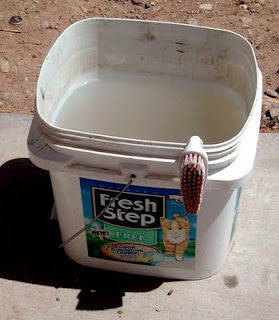Carl returns from town. He pulls up a chair at the picnic table. I am boiling water for tea. The sky is clear. The air cool. The sun hot. "Life is a journey," he says, as if reading the tagline to my blog.
For Carl it is a journey in two parts. Part I: poverty, alcoholism, war, violence, crime, prison.
Part II: rehabilitation, hard work, illness, introspection and peace.
 |
| Carl |
My opinion of Carl as I sit and talk with him is on the rise. I understand better now how he sees the world.
"Being an adolescent is not taking responsibility for yourself and your actions," he says. Too many people remain adolescents all their lives, expecting someone or something to take care of them. When this doesn't happen they lash out at the world, become angry, depressed, Carl believes.
We talk and talk. We are interrupted by a beautiful dove perched on a trickling water faucet tipping her beak into the droplets to drink. "Isn't she beautiful," exclaims Carl, who once has a wolf as a pet.
The dove flies off. Back to the real world. Carl shakes his head.
"I tell young people, 'don't even try to be wise before you are 30'," he says. "You can't do it."
Carl's early years were tough. He served time in a federal penitentiary off the coast of Washington after coming back from Korea with post traumatic stress disorder for stealing weapons from an Army depot. He gave himself up. Later he served time in Virginia, for car theft and robbery.
In prison, he says, he learned a lesson. "You're not a criminal," a mob hit man told him while at McNeil Island. "You don't have a criminal mind. You don't think like a criminal. That's why you can't make it here. I am a criminal. I kill people.".
Carl received an amplification of that message from a sentencing judge who called him to the bench. "You're not a criminal," the judge told him. "You are an alcoholic. Get help."
 |
The rage that fueled an
early rebellion is gone. |
Released from prison in Virginia after 28 months he went to Minnesota to a mission. He gave up drinking. Signed on with AA. Got work. And, he says, sought personal help from the Creator.
"I became humble. I asked for guidance. I had to acknowledge to myself that, on my own, I could not make my life work."
Spent was the rage that fueled his early rebellion. In its replacement came hard work. Businesses, construction, painting, contracting, driving semis. Marriages and divorces.
Peace took a little longer. Now he says he owns it. "Now I know who I am," he confides. "I neither ask for approval or give any."
He lives in his van. Mornings he wakes to bird song and gleams of sun on the lake below. He says he is not finished with his work here.
"I have made some amends. I probably have more to go."
Seeing the world through post adolescent eyes he finds it beautiful and he is grateful to be part of it.
"You get knocked about a bit. You grow up. Say, have you seen Oregon?" he asks, changing the subject. "You should drive up the coast. It is wonderful."
____________
My good friend Sue,
whose eminently readable and beautifully illustrated blog you should read, came for breakfast Sunday morning -- eggs, bacon, toast, tea, juice, oatmeal and more, prepared al fresco and served in outdoor elegance on a park picnic table. Who says one doesn't dine well well on the go?
I should have taken a photograph of the set table but didn't. A picture of the predawn sun's glimmer on the lake just hours before will have to do.
 |
| Rising sun above Elephant Butte Lake. [Please click photo] |
JNR
































